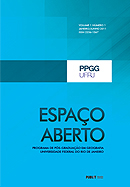How We Experience and Understand the Borders with Argentina and Paraguay from the Brazilian Side
DOI:
https://doi.org/10.36403/espacoaberto.2020.30145Keywords:
Brazilian Borders, Brazilian Nation-state, Brazil, Paraguay and ArgentinaAbstract
Starting with the idea that the way we think about borders is an elaboration of a specific border that we imagine and experience ourselves, this article has the aim of presenting local understanding of inhabitants and researchers concerning the Brazilian side of the borders with Paraguay and Argentina. This local understanding is, at the same time, an explanation of the argument that paradoxical collective experience along the border is equally instituted by the presence of nation-states in people’s lives and a reflexive demonstrative exercise of how this understanding correlates with the political and institutional context which constitutes us as nationals. Results from primary research are used to illustrate four predominant themes which involve different methodologies: work; violation of rights; formal education; and history and memory of building symbolic spatial borders.Metrics
Metrics Loading ...
Downloads
Published
2020-05-19
How to Cite
SILVA, Regina Coeli Machado e. How We Experience and Understand the Borders with Argentina and Paraguay from the Brazilian Side. Espaço Aberto, Rio de Janeiro, Brasil, v. 10, n. 1, p. 83–98, 2020. DOI: 10.36403/espacoaberto.2020.30145. Disponível em: https://revistas.ufrj.br/index.php/EspacoAberto/article/view/30145. Acesso em: 22 nov. 2024.
Issue
Section
Fazer a fronteira - dinâmicas sócio espaciais em áreas de fronteiras internacionais
License
The copyright of articles published in Espaço Aberto belong to their respective authors with rights to first publication conceded to the journal. Every time that the article is cited and reproduced in institutional repositories or personal and professional web pages the link to the journal web page must be provided. The articles are simultaneously licensed under the Creative License Commons BY-NC-SA 4.0.


